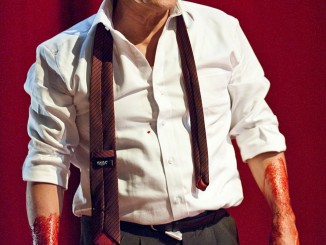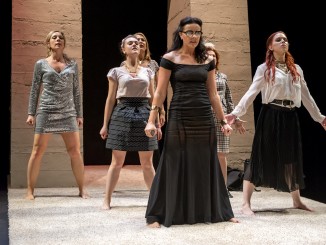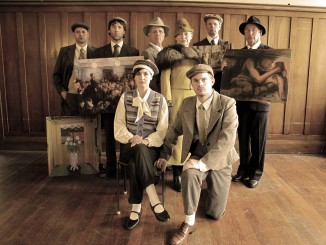
Game of Thrones [by James Wenley]

When I consider King Lear I think of the high grand tragedy, the demands of the title role and the master actors who have played him, and I conjure the harrowing image of the old man against the storm on the heath. It was pleasing to be reminded that the play begins (where it all begins really) with humorous sexual bawdy concerning the mother of Gloucester’s bastard son Edmund – “good sport at his making” – rather than anything loftier. The action of this production of King Lear plays out on a large circular stage by designer Jessika Verryt – an image of a flat earth that at any moment they could teter off. It is a fitting image for a play that contains the gamut of human experience: family feuds; wisdom and madness, power and greed; compassion and the worst inhumanity and violence mankind is capable of. The mix of themes high and low and the damning portrait of humankind is the best stuff of Mr. William Shakespeare. But what truly elevates Lear specifically from others in his canon is its focus on our weakness and mortality. Death not by the swift sword, but – to borrow the sentiment of another Shakespeare tragedian – death by a thousand natural cuts. Verryt’s stage also becomes the wheel of time that will catch all in the end be they Kings, Popes, academics: the tragedy of the aging; decay of the body and the mind.
At the far side of outdoor lawn at the Old Arts Quad are images of great beauty: the heavens, the cosmos. Behind them are shining lampposts that dot the paths behind the set that by happy accident seem extend out and back, enlarging the vista. Brad Gledhill’s lighting complements the disappearing light of the out in the open evening. We are situated amongst this all too: tiered seating on two sides is like a sheer cliff, and we look down at the players from above. Edmund speaks of the folly of blaming and crying out to the heavens as if “if we were villains by necessity; fools by heavenly compulsion”. In Director Lisa Harrow’s production her figures are all too earth bound, focussed on themselves and their own quest for power, cut off from anything higher or worthier. Making her directorial debut, Harrow presents a production that is grounded, uncluttered, and where the text is King.
King Lear represents the 50th Anniversary of the University’s of Auckland’s Summer Shakespeare tradition. While in recent years the tradition has been for student and alumni directors and actors etcetera, this production nods back to the institution’s origins under Professor Sydney Musgrove in which his 1963 Hamlet was a co-production with long defunct Grafton Theatre company. There are big names attached to this Lear. Harrow acted in that 1963 Hamlet and went to the Royal Academy of Dramatic Art in Britain and joined the Royal Shakespeare Company. Sam Neill is an executive producer. Gareth Farr composed the suitably bombastic score. Alongside Auckland University students and staff, the cast includes RADA trained Calum Gittins (Edmund) and Toi Whakaari grad Andrew Paterson (Edgar). While there is a trade-off in terms of student involvement and spirit, the professionalism gives Auckland audiences arguably the best local Shakespeare since Michael Hurst’s 2004 Macbeth. Hurst has been instrumental in rescuing Summer Shakespeare in recent years by spearheading a new trust, and acts for this production as two Fools: the famous fool to King Lear, and ‘Directorial Consultant’ to Queen Harrow. But it is another Michael who has attracted much interest.
Emeritus Professor and internationally respected Shakespeare Scholar Michael Neill, who appeared in some early Summer Shakespeares but hasn’t acted since the 1970s, takes the titular honour. In a University visit in my final year of high-school I remember the piercing clarity in which Neill spoke on Lear in a special lecture. He brings, and delivers, decades of thinking about the play in a performance in which every word and thought has clear meaning and purpose. Where he lacks in an actor’s physicality and expression, he compensates in voice: gloriously rich and pleasing to the ear, it is this instrument that expresses the totality of Lear’s journey: from commanding, to gruff and barking, to deeply vulnerable and broken. His Lear enters to pomp and pageantry, a regal figure in red who commands from an elegantly textured wooden throne. His initial warm-hearted and even demeanour breaks into a grimacing childish tantrum when his youngest daughter Cordelia refuses to reduce the love she holds for her father into empty words. His is a Lear surrounded by yes men and sycophants, and by the end of the first scene he has divided his kingdom in two between his elder daughters, Cordelia is disowned, Kent is banished, and Lear has well and truly thrown his toys out of his cot. We feel the age of Neill’s Lear: regret, guilt, and a lifetime of choices catch him when his power is stripped away and no longer as the Kingdom to hang his identity on. He vividly communicates his fear of infirmity, his forlorn hope that he will be kept “in temper”.
Hurst’s Fool enters (earlier than in Shakespeare’s text) with a cartwheel, wearing an exaggerated Jester’s hat and boots. Aware of his status, he keeps low, off the stage, watching, like us. Hurst is always calculating, emoting, making faces, and is deeply saddened as he witnesses Lear’s treatment of Cordelia. The Fools witticisms and pointed commentary (the only one who can challenge Lear and get away with) roll easily off his tongue, but in this production, not only is he a check on Lear’s actions, he becomes Lear’s emotional heart and conscience too. Hurst’s bounding energy and vitality really make us feel the loss when he disappears after the interval, the production giving way to a bleak atmosphere without the comic respite from the Fool.
Harrow clearly shines as an actor’s director, and the production contains great work from the lead cast. Gittin’s is of the Edmund charm school, moulding the audience like putty during his ‘Bastard’ monologue which he delivers to us with easy candour, and his machinations are one of the many enjoyable elements. Patterson’s Edgar doesn’t make much of an initial impression, but when the character assumes the identity of a Smeagol-like Poor Tom we are captivated. Together with Peter Stephen’s loyal and weathered Kent, they make a compelling positive argument for human decency and care, a counterpoint to the overwhelming destructive elements in the play, like the coldness of Lear’s heart or Edmund’s cancerous baseness. Lear’s daughters Goneril (Lucinda Hare), Regan (Kate Watson), and Cordelia (Anthea Hill) are excellent; Hill makes her small stage time matter for us to be moved by her end, Hare uses a fiery voice and manner to get her way and our attention while Watson’s take is subtler and slinkier. Geoff Snell’s Gloucester ably carries the play’s B-Plot, flummoxed by circumstances moving out of his grasp. Tom Bishop’s makes much of the comic potential of dithering servant Oswald
There are a number of scenes involving attendants and banner bearers, and the one challenge the play was not able to surmount was the curse of the passive bystander. The work from the ensemble is not consistent, and it only takes one to break focus and draw the audience’s attention away from the main action. A late battle scene begins epically with a roaring speech from Edmund as smoke totally consumes the stage, Farr’s score rises, and armoured figures take battle. It was regrettable then to clearly see one soldier widely smiling throughout (apparently from the ‘Argent Lords’ group who only take part in this one sequence), and ruining the effect and play’s professionalism.
The storytelling in this Shakespeare is crystal clear, from the character’s motivations to their allegiances. Each political faction is represented by a different colour and emblem in their costuming. Lear and his attendants are dressed with royal red and a Dragon. Gloucester is a Boar. Cornwall is an Eagle. Albany a Phoenix. The number of their attendants swell according to which faction is ascendency. Lear’s fall is underlined by the rapid extinction of the Dragons.
This production of Summer Shakespeare has risen to the occasion of their 50th Anniversary, but more importantly, the occasion of Shakespeare’s great Tragedy. Long may Summer Shakespeare reign.
King Lear is presented by Auckland Summer Shakespeare and plays at the Old Arts Quad until 30 March. Details see The Maidment.




Lucinda hare is also a Toi grad – just so your awear